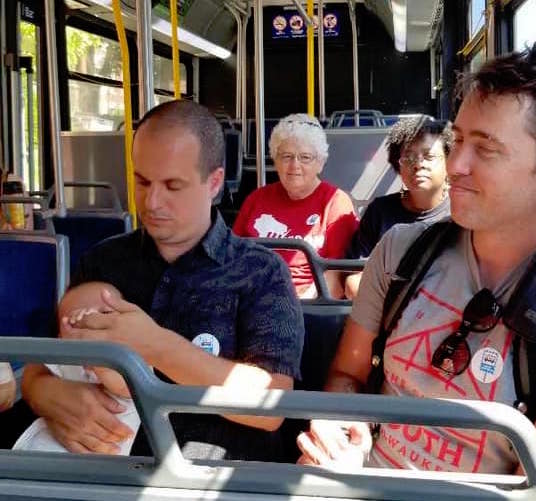
The Transit Week of Action 2019 was held in cities around Wisconsin to talk about the significance of public transportation. Eight organizations (Sierra Club, WISDOM, WISPIRG, 1000 Friends of Wisconsin, Faith Voices for Justice, ATU, Chippewa Valley Transit Alliance, and La Crosse Area Transit Advocates) celebrated the freedom that public transportation gives to all community members. The event was incredibly successful, with 100 transit rider stories collected across the state, and more than 150 people participating.
Bus systems benefit all Wisconsinites, especially people who do not have a car or are unable to drive. People who rely on public transportation can use bus systems to get to work, school, a doctor’s office, and social opportunities. The freedom to get around without a car should be accessible to anyone, and everyone should have the same mobility options to get to work, school, or wherever they are going.
During the Week of Action, there were events in Milwaukee, Waukesha, Racine, Madison, La Crosse, Eau Claire, Appleton, Oshkosh, Washburn, and Ashland. Seven state legislators directly demonstrated their support: Senator Chris Larson, Representative Jonathan Brostoff, Senator Lena Taylor, Representative David Crowley, Representative Jill Billings, Senator Jennifer Shilling, and Senator Jeff Smith. Milwaukee advocates had three Ride the Bus days with legislators. Waukesha had a Transit Day where advocates collected stories, spoke with the press, and gave donuts to transit riders. La Crosse had an open house, and a press conference announcing their first electric buses. Eau Claire legislators held office hours on the bus. Also, Racine, Madison, Appleton, Oshkosh and Washburn had volunteers collecting a total of 99 stories.
These personal stories of Wisconsinites talking about their experiences on public transportation will be posted every Tuesday on our Facebook page, under our new series #TransitTuesday. Concerns for public transportation in Wisconsin include limitations on how far bus routes extend, as well as lack of support for community bus systems. The borders of routes end at county or city lines, but people's lives extend beyond city limits, and so should public transportation. Ample stories reflected this.
When going out and talking to people, many agreed that public transportation was important, but also saw improvements that could be made. Riders wanted more routes, more routes reaching farther locations, as well as GPS on buses to track exactly where they are. People were also interested in a high-speed rail system, which would increase mobility from Chicago to Minneapolis.
Mentioned above, Waukesha gave out donuts to celebrate public transportation. Riders gave their point of view of the public transportation in their city, such as rider Sergio: “I think the bus is a fantastic ride. I ride the bus every morning to work; it gets me there on time, exactly, but sometimes I have problems with getting back home. I get off work at 4:00, and then I have to wait 49 minutes just to get on the next bus line, so I might as well walk before I wait for the next bus.”
La Crosse had their unveiling of two new buses, and announced that they will be getting electric buses soon. These buses will be more efficient, cutting back the total amount spent on buses. “The average life of a diesel bus is 12 years and 500,000 miles. Over that 12 years we are really hoping to look at roughly $400,000 difference in maintenance and fuel efficiency cost,” stated Adam Lorentz, the La Crosse Municipal Transit Utility Director.
At another event during the week, Milwaukee resident Jenny shared her story. “I am legally blind, and don’t see well enough to drive, so I depend on public transit to go everywhere I need to go. I use it every day to get to and from work; I ride it to the library, to volunteer events, and to popular Milwaukee attractions like the Doms, Discover World, and the Art Museum. I even rode the bus last week to get to the fireworks on the lake. I think that even if I could see well enough to drive, I would still ride public transit because it is affordable and it helps you avoid the hassle of finding a parking spot.”
Milwaukee was the largest city to have Transit Week of Action events, but even rural areas like Washburn had participants. Veronica is a rider of Bay Area Rural Transit in Wisconsin (BART). “It's been helpful on the days I’m stuck in Ashland, no way back home. It’s only $2.75 from Ashland to Red Cliff,” Veronica said. “I meet new people all the time, I know all the drivers, and I hear interesting stories.” The BART system extends through eleven communities and crosses three counties. By extending the boundaries over county lines, this opens opportunities for riders in the Chequamegon Bay Region.
We want to see improvements made to the bus system to provide more opportunities to riders, but this will only happen if decision-makers hear your voices. Thank you to all of the participants of the Week of Action. We are excited to express the importance of public transportation by taking the bus, using #SupportTransit, sharing stories on #TransitTuesday, and continuing to take action through our transportation team.
The Week of Action was another step toward an equitable transportation system. To learn more, check out our report Arrive Together.
Written by Erin Fitzgerald, Project Aide with the Sierra Club Wisconsin.